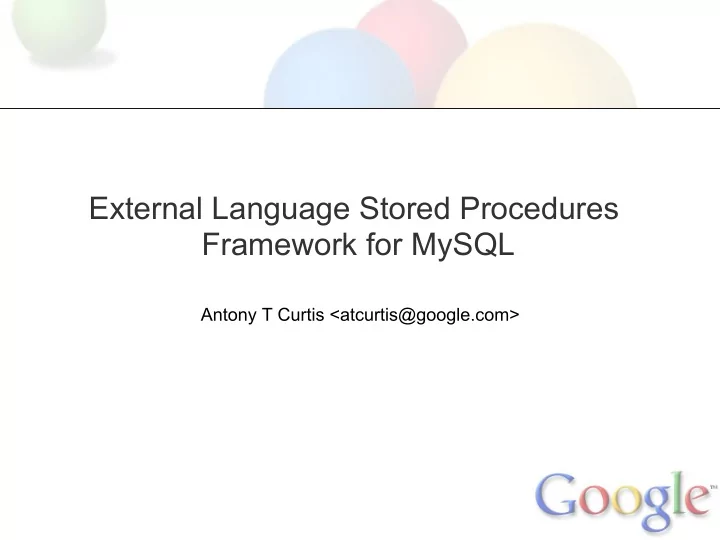

External Language Stored Procedures Framework for MySQL Antony T Curtis <atcurtis@google.com>
Project history... Started as a UDF-ng project inside MySQL in 2006. Primary collaborator - Eric Herman. First functional alpha in 2007 (Heidelberg). Public "unsupported" beta release in UC 2008. Maintained and enhanced using Google 20% time. Plug-ins developed for: Java (non-fenced) Perl (non-fenced) XML-RPC https://launchpad.net/sakila-server/wl820 https://launchpad.net/mysql-wl820/trunk/5.1.33-wl820
But we already have UDFs... External Stored Procedure User Defined Function Fine grained ACLs No access control. C/C++, Java, Perl (so far) Only C/C++ supported. Supports dynamic SQL No dynamic SQL Supports multiple result-sets No support for result-sets No varadic support Supports varadic params Simple value results Casted value results Supports table functions Cannot use as table No aggregates (workarounds exist) Aggregate functions
Implementation Objectives Few changes to the parser Closer to SQL standards Minimal changes to the stored procedure engine Only one new instruction class Minor change to system tables Change 'language' column from ENUM to VARCHAR Refactor Protocol classes Avoid using preprocessor, use object orientation Use embedded 'protocol' for dynamic SQL Minor change to libmysql client libraries add less than 10 lines of code Keep server changes small / low impact
Server Overview
Implementation MySQL Stored Procedure execution "instruction" class sp_instr ... { /** Execute this instruction @param thd Thread handle @param[out] nextp index of the next instruction to execute. (For most instructions this will be the instruction following this one). Note that this parameter is undefined in case of errors, use get_cont_dest() to find the continuation instruction for CONTINUE error handlers. @retval 0 on success, @retval other if some error occured */ virtual int execute(THD *thd, select_result *result , uint *nextp) = 0; }; New subclass for external stored procedures: class sp_instr_external
Table Functions bool mysql_derived_filling(THD *thd, LEX *lex, TABLE_LIST *orig_table_list) { ... /*check that table creation pass without problem and it is derived table */ if (table && unit) { ... if (unit->is_union()) { // execute union without clean up res= unit->exec(); } else if (unit->is_table_function()) { ... res= derived_result->prepare(unit->types, unit) || unit->sp->execute_procedure(thd, &args, derived_result); } else { ...
Server Parser Overview
Plug-in Essentials /* Plugin type-specific descriptor */ static struct st_mysql_psmlanguage example_psm_descriptor= { MYSQL_PSM_LANGUAGE_INTERFACE_VERSION , /* interface version */ example_psm_find, /* function resolution function */ example_psm_release, /* function release function */ example_psm_execute /* execute function */ }; /* Plugin library descriptor */ mysql_declare_plugin(example) { MYSQL_PSMLANGUAGE_PLUGIN , /* type */ &example_psm_descriptor, /* descriptor */ "Example", /* name */ . . .
Plug-in Essentials, part 2 struct st_mysql_psmcontext { ... inline int store_null(int idx); inline int store_string(int idx, const char *str, int length, struct charset_info_st *cs); inline int store_double(int idx, double nr, int precision); inline int store_integer(int idx, long long nr, char unsigned_val); inline int store_time(int idx, struct st_mysql_time *ltime); inline int val_null(int idx); inline const char *val_string(int idx, char *str, int *length, struct charset_info_st **cs); inline long long val_integer(int idx); inline double val_double(int idx); inline int field_ptr(int idx, int *field_type, void **ptr, int *length); inline int row_field(const char *title, int field_type, int size, int precision); inline int row_prepare(); inline int row_send(); inline int row_send_eof(); ... }
Declaring routines New/changed routine attributes: LANGUAGE <identifier> EXTERNAL NAME <string-literal> DYNAMIC RESULT SETS <numeric-literal> Function return type extension: TABLE ( <field-declaration> ... )
Dynamic SQL support Minimal change to libmysqlclient library - No change to ABI. MYSQL * STDCALL CLI_MYSQL_REAL_CONNECT(MYSQL *mysql,const char *host, const char *user, const char *passwd, const char *db, uint port, const char *unix_socket,ulong client_flag) { ... DBUG_ENTER("mysql_real_connect"); #if defined(HAVE_CC_WEAK_ATTRIBUTE) || defined(HAVE_CC_WEAK_PRAGMA) if (ext_mysql_real_connect && mysql->options.methods_to_use != MYSQL_OPT_USE_REMOTE_CONNECTION) { ... if (mysql->options.methods_to_use == MYSQL_OPT_USE_INLINE_CONNECTION || (mysql->options.methods_to_use == MYSQL_OPT_GUESS_CONNECTION && (!host || !*host || !strcmp(host,LOCAL_HOST)))) DBUG_RETURN(ext_mysql_real_connect(mysql, host, user, passwd, db, port, unix_socket, client_flag)); } #endif /* Don't give sigpipe errors if the client doesn't want them */
Dynamic SQL support, part 2 External routines can use dynamic SQL simply by using libmysqlclient library. Example: Using Perl, you can use dynamic SQL simply by using DBD:: mysql as is. sub test1() { my $dsn= "DBI:mysql:test"; my $dbh= DBI->connect($dsn, undef, undef) or die "Failed $!"; $dbh->do("INSERT INTO test.t1 (txt) VALUES ('hello world')"); # This routine has no resultsets return undef; }
Example: XML-RPC Routines mysql> create function xml_get_state(id int) -> returns text -> no sql -> language xmlrpc -> external name -> 'xmlrpc://betty.userland.com/RPC2;examples.getStateName'; Query OK, 0 rows affected (0.00 sec) mysql> select xml_get_state(40); +-------------------+ | xml_get_state(40) | +-------------------+ | South Carolina | +-------------------+ 1 row in set (0.42 sec)
Example: XML-RPC Routines, part 2 find_routine: parse and validate supplied URL and return a handle for the xmlrpc service exec_routine: invoke xmlrpc service and then marshall the result back to mysql. Code is in /plugins/psm_xmlrpc/ Brief code walk-through...
Future directions Support dynamic SQL from Java (work underway by Eric Herman) Support more languages - Python, Lua, PHP? Support dynamically declared routines... example: CREATE FUNCTION get_env(arg varchar(32)) RETURNS TABLE ( `key` VARCHAR(128), `value` VARCHAR(2048) ) LANGUAGE Perl AS ' my @result = (); foreach my $var (keys %ENV) { next if defined($arg) && !($key =~ m/$arg/); my %row = ( key=>$var, value=>$ENV{$var} ); push @result, \%row; } return \@result;' ;
Questions? Antony T Curtis <atcurtis@google.com>
Recommend
More recommend